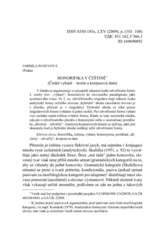Honorifika v Češtine (česke vykani - teorie a korpusova data)
On honorification in Czech: The Czech polite forms: Theory and corpus data
| dc.creator | Panevova, Jarmila | |
| dc.date.accessioned | 2018-05-19T18:36:41Z | |
| dc.date.available | 2018-05-19T18:36:41Z | |
| dc.date.issued | 2009 | |
| dc.identifier.issn | 0350-185X | |
| dc.identifier.uri | https://dais.sanu.ac.rs/123456789/3192 | |
| dc.description.abstract | The author claims that the Czech polite forms (so-called 'vykani') for addressing the 2nd person should be understood as a legitimate part of the Czech conjugation paradigm. If we address a single person in a polite way some Czech analytical verb forms exhibit 'hybrid' agreement (auxiliaries are in plural, while participle form is in singular). However, the paradigm for singular and plural polite forms (addressing a single person, or two or more persons, respectively) is not symmetrical. The question, whether 2nd person plural polite forms are ambiguous (between the polite meaning and 2nd plural non-polite), or whether the semantic distinction 'polite - non-polite' is neutralized in plural, is open for further discussion. Some corpus data illustrating the contexts for the 2nd person polite forms are analyzed here too. | en |
| dc.rights | openAccess | |
| dc.rights.uri | https://creativecommons.org/licenses/by-nc-nd/4.0/ | |
| dc.source | Јужнословенски филолог | |
| dc.title | Honorifika v Češtine (česke vykani - teorie a korpusova data) | CZE |
| dc.title | On honorification in Czech: The Czech polite forms: Theory and corpus data | en |
| dc.type | article | |
| dc.rights.license | BY-NC-ND | |
| dcterms.abstract | Паневова, Јармила; | |
| dc.citation.spage | 101 | |
| dc.citation.epage | 108 | |
| dc.citation.issue | 65 | |
| dc.identifier.doi | 10.2298/JFI0965101P | |
| dc.type.version | publishedVersion | |
| dc.identifier.fulltext | https://dais.sanu.ac.rs/bitstream/id/20929/3270.pdf | |
| dc.citation.other | (65): 101-108 | |
| dc.identifier.rcub | https://hdl.handle.net/21.15107/rcub_dais_3192 |
Files in this item
This item appears in the following Collection(s)
-
Јужнословенски филолог / Južnoslovenski filolog
ISSN 0350-185X; eISSN 2406-0763

